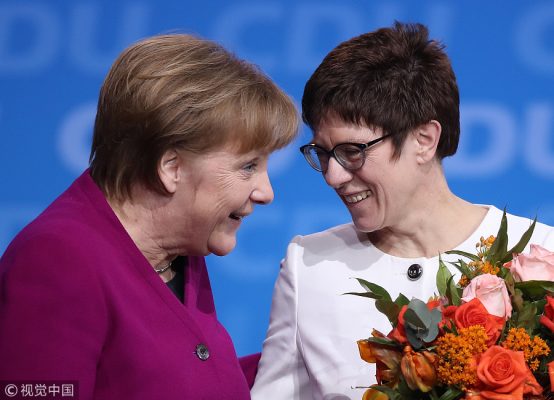
BERLIN – Annegret Kramp-Karrenbauer’s election as general-secretary of Germany’s ruling party puts her in pole position to succeed Angela Merkel as chancellor after spending most of her career in a tiny state on the French border. Combining social conservatism with left-wing economic views, AKK – as she is often known – is a close Merkel ally.
But taking on an important national role for the Christian Democratic Union (CDU) is a big step for the unassuming 55-year-old who has been premier of the state of Saarland until now and likes dressing as a cleaner during an annual pre-Lent carnival. Dubbed a “Mini-Merkel” by German media, she is moving into a job that Merkel had before she became chancellor and is increasingly seen as heir apparent though a coalition deal that will keep Merkel in power is now close.
After her election on Monday, Kramp-Karrenbauer said: “There comes a time in everybody’s life when it’s no longer enough to point and say he or she should do it, but you have to answer yourself … That’s why I put myself at the party’s service.”
In her new role she will organise the party, election campaigns and congresses, support the work of the party’s chief – Merkel – and represent the CDU’s views externally.
Mass-selling newspaper Bild put Kramp-Karrenbauer’s appeal down to being “a very average person” to whom ordinary Germans could relate.
But Kramp-Karrenbauer once said of herself: “It’s hard to pigeonhole me.”
She attracted attention and respect from fellow conservatives last year by winning a resounding victory in a state election which Merkel described as “sensational”.
Her triumph punctured the hype around Martin Schulz, then the newly elected leader of the rival Social Democrats, and gave the conservative CDU momentum before a federal election.
Saarland’s first female premier, she rose to prominence in 2012 by calling off a three-way coalition with the Greens and liberal Free Democrats (FDP) after just five months in office. The gamble alarmed some conservatives but paid off when she emerged victorious from the subsequent snap election.
Economically she is on the CDU’s left, being a strong advocate of the minimum wage. Before the 2013 national election she suggested the top rate of tax be raised to 53 percent, resulting in the FDP’s Rainer Bruederle branding her a “Socialist varnished in (the CDU’s) black”.
But she is conservative on social issues, opposing advertising for abortions, and caused controversy in 2015 by saying allowing same-sex marriages could open the door to incest and polygamy. Her conservatism manifests itself in modern forms. She married at 22, but it is her husband, a former mining engineer, who stays at home to look after their three children while she focuses on her career.
“My husband and I had a very pragmatic agreement right from the start: whoever earns more works full time,” she once said. “So we switched the classic roles.”


